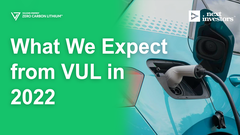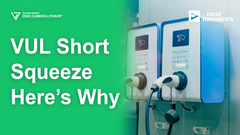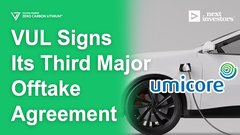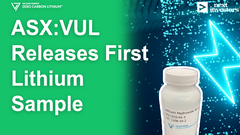VUL secures a potential US$1B Lithium deal with leading EV carmaker
Having initiated coverage on our investment in Vulcan Energy (ASX:VUL) in June 2020, the company has proved to be one of our best picks yet.
We were initially drawn to VUL’s carbon neutral process, the magnitude and quality of its Lithium Brine Project, proximity to European EV customers, and land access agreements in place. But now, even after its 3000%+ share price rise since adding it to our portfolio, VUL continues to deliver as we watch the offtake agreements roll in and head towards completion of its highly anticipated Definitive Feasibility Study later this year.
VUL today announced its second major offtake agreement in as many weeks , securing a five-year (extendable) strategic partnership to supply Renault Group with its Zero Carbon lithium product.
The deal sees Renault secure between 6,000 and 17,000 metric tonnes per year of battery grade lithium chemicals from VUL’s Zero Carbon LithiumTM Project in Germany.
We’ve calculated that at the current (and still rising) lithium hydroxide spot price, that equates to a rough estimate of up to ~US$1,275,000,000 to Vulcan over the five year term — that’s well above Vulcan’s entire current market cap. And it doesn’t yet account for anticipated higher lithium price ... or for any premium pricing that we expect VUL will be able to command for its lithium being Zero Carbon.
The potential revenue from today’s deal with Renault comes just two weeks after VUL signed a binding term sheet for an offtake with LG , the world’s largest lithium ion battery producer for Electric Vehicles.
We estimate that deal will be worth another ~US$150 million per year to VUL , or ~US $750 million over the initial five year term beginning 2025, which can be extended for another five term.
You can find our coverage on VUL’s deal with LG HERE .
A pioneer in the EV space, Renault is targeting worldwide carbon neutrality by 2050. It has accelerated its EV strategy to reach the greenest mix in the European market by 2025 — with over 65% of electric and electrified vehicles in Renault’s sales mix, and up to 90% of its production will be battery electric vehicles by 2030.
The company confirmed its leadership in the fast-growing European electric market, selling 115,888 vehicles in CY 2020, doubling its EV sales for 2019. Those sales span the Renault Group’s five brands: Renault, Lada, Dacia, Alpine and MobilisePlus.
It also has alliances with Nissan and Mistsubishi Motors. That’s not guaranteeing that the agreement with Renault will lead to anything with the Japanese motor giants, but it sure could put VUL on their radar.
The group’s partnership with VUL will allow Renault to avoid from 300 to 700 kg of CO2 for a 50-kWh battery, delivering on Renault’s stated environmental and social responsibility that is at the heart of its "Renaulution".
As is the case for the LG term sheet, VUL’s deal with Renault is also conditional on a definitive formal offtake agreement, both of which are expected in November 2021. Along with the upcoming DFS, these formal agreements are major milestones for investors to look forward to.
VUL’s Pre Feasibility Study earlier in the year estimated a production volume of 40,000 tonnes per annum of lithium hydroxide, so under the strategic partnership, Renault could be taking between 15% and 42% of VUL’s annual production.
So far Renault want 6000-17,000 tonnes lithium hydroxide per year and LG has signed up for another 10,000 t/year.
But with VUL’s estimated production volume of 40,000 tonnes per annum of lithium hydroxide from its existing project (as detailed in its PFS), that doesn’t leave much of VUL’s forecast supply unaccounted for.
That will be even more true if the rumours are anything to go by...
As reported by Reuters, VUL could soon have another offtake deal secured. This time with Stellantis Group — the fourth largest automaker in the world and largest European automaker by volume, that was formed via the merger of Fiat Chrysler Automobiles and Peugeot-Citroen earlier this year.
Stellantis announced last month they have "an Offtake MoU with a geothermal lithium partner in Europe". With a target of 70% of its European sales to be Electric Vehicles by 2030 and plans to invest more than €30 billion through 2025 to build 3 giga-factories in Europe, Stellantis will surely want to secure much needed lithium supply.
If that is the case, combined agreements with LG, Renault and Stellantis could give VUL a major slice of the European lithium supply market within a few short years.... And suggests that VUL’s impressive share price run could just be the start of things to come.
It’s a great example of the kind of investment we look for: a long term hold while the company delivers on a plan, leading to a sustained and long-term share price rise.
VUL looking ahead to shore up Li supply?
Backed by its strategically assembled and world class geothermal lithium brine team, VUL is sure to be looking ahead to how it can best leverage its expertise...and increase battery grade Zero Carbon lithium supply to the hungry EU Electric vehicle market.
The company only recently announced the acquisition of a new 108km2 exploration license that is "prospective for geothermal brines", and we expect further land acquisitions in what could prove to be somewhat of a "geothermal lithium brine land grab" in the years ahead.
Any still-to-be-developed projects and underexplored brines will likely be quickly picked up by producers that have the required technical expertise and cash available to get new lithium supply to market... which we think points to major opportunity for VUL to further expand.
And there will be no lack of demand as the world makes the switch to Electric Vehicles, in what is estimated to be a $5 Trillion undertaking (yep, that’s TRILLION with a T).
Leading the charge is the European Union with its Green Deal — a set of policy initiatives aiming to make Europe climate neutral by 2050. This includes a focus on securing locally sourced supply chain materials in order to cut carbon costs along every step.
This is a major advantage of VUL. Not only is it developing its Zero Carbon LithiumTM product from geothermal brines, but its Zero Carbon LithiumTM Project is located in Germany, right by all the major European car makers.
General Information Only
S3 Consortium Pty Ltd (S3, ‘we’, ‘us’, ‘our’) (CAR No. 433913) is a corporate authorised representative of LeMessurier Securities Pty Ltd (AFSL No. 296877). The information contained in this article is general information and is for informational purposes only. Any advice is general advice only. Any advice contained in this article does not constitute personal advice and S3 has not taken into consideration your personal objectives, financial situation or needs. Please seek your own independent professional advice before making any financial investment decision. Those persons acting upon information contained in this article do so entirely at their own risk.
Conflicts of Interest Notice
S3 and its associated entities may hold investments in companies featured in its articles, including through being paid in the securities of the companies we provide commentary on. We disclose the securities held in relation to a particular company that we provide commentary on. Refer to our Disclosure Policy for information on our self-imposed trading blackouts, hold conditions and de-risking (sell conditions) which seek to mitigate against any potential conflicts of interest.
Publication Notice and Disclaimer
The information contained in this article is current as at the publication date. At the time of publishing, the information contained in this article is based on sources which are available in the public domain that we consider to be reliable, and our own analysis of those sources. The views of the author may not reflect the views of the AFSL holder. Any decision by you to purchase securities in the companies featured in this article should be done so after you have sought your own independent professional advice regarding this information and made your own inquiries as to the validity of any information in this article.
Any forward-looking statements contained in this article are not guarantees or predictions of future performance, and involve known and unknown risks, uncertainties and other factors, many of which are beyond our control, and which may cause actual results or performance of companies featured to differ materially from those expressed in the statements contained in this article. S3 cannot and does not give any assurance that the results or performance expressed or implied by any forward-looking statements contained in this article will actually occur and readers are cautioned not to put undue reliance on forward-looking statements.
This article may include references to our past investing performance. Past performance is not a reliable indicator of our future investing performance.






